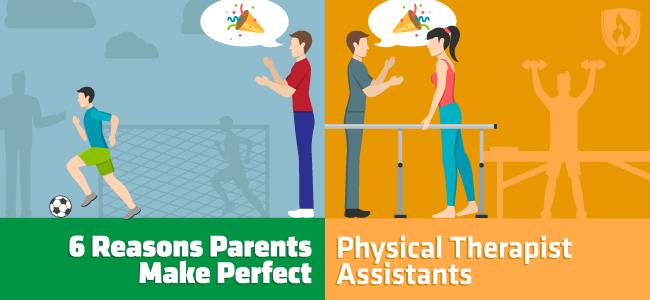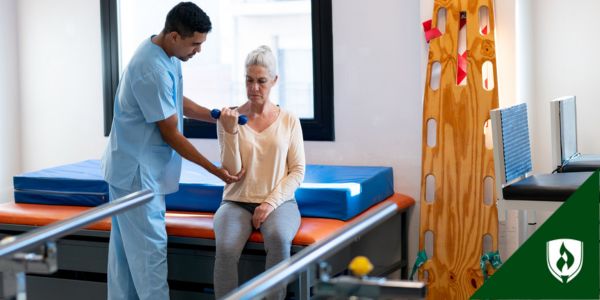
You’ve always been intrigued by the healthcare field, but you can’t imagine working crazy shifts as a nurse when you have such a crazy schedule as it is. You’re already trying to balance all of the activities of your busy family. You need steady work hours that allow you to be there regularly for your kids, from school drop-offs and band practice to weekend recitals and soccer tournaments.
Don’t give up your search for a satisfying healthcare career just yet! Working as a physical therapist assistant could meet your needs as a busy parent who wants to make a difference with your career. What’s more is that your preexisting parenting skills may have already given you a jumpstart in the job!
Many of the same characteristics that make you a great parent can translate directly into a career as a physical therapist assistant (PTA). If you see yourself in this list, you just might have what it takes to be a successful PTA!
Parents make great physical therapist assistants because …
1. They thrive in a team setting
Everyone knows it takes a village to raise children. From teachers and coaches to carpools and play dates, you are constantly coordinating your kids’ activities, plus keeping track of your own! The organization and communication skills you use to keep your family up and running on a daily basis will come in handy as a physical therapist assistant.
PTAs typically work on a team with other PTAs, physical therapists and physical therapy aides. With so many people working together, a strong sense of communication and teamwork is vital in order to keep everyone on the same page. Luckily, you’ve already had plenty of practice at sharing important details and keeping things neat and organized in your role as a parent.
2. They’re master observers
You can tell as soon as your kids hop in the car whether they’ve had a bad day at school, and you love noticing your toddler learn new skills and milestones as he plays. You may not think this is anything special, but the truth is that it takes serious observation skills and attention to detail to pick up on these things.
PTAs work with patients to improve their range of motion after an illness or injury. They spend much of their day observing patients and taking careful notes on any progress or setbacks they experience that may need to be shared with the physical therapist. Your innate intuition makes you a prime candidate as a PTA who can spot exactly what a patient needs.
3. They’re incredible listeners
Your kids know they can always come to you with questions big or small. That’s because you’ve always got a listening ear. You instinctively know when to let your kids talk through something on their own, and when it’s time to speak up and offer advice or suggestions.
This type of active listening is one of the top skills for a PTA. Physical therapist assistants need a full understanding of what their patients are going through, both physically and emotionally. PTA’s who aren’t in tune with what their patients need will be limited in how much help they can offer. Your natural ability to balance listening with offering advice puts you in the perfect position to empathize with your patients during a difficult time.
4. They’re always concerned with safety
You can walk into a room and immediately pinpoint choking hazards for your baby. When your little monkeys start jumping on the bed next to the sharp fireplace hearth, you can anticipate the accident waiting to happen. And when one of your kids does come running with tears and an injury, you can quickly assess how serious the situation truly is.
Part of a PTA’s job is to push patients to their physical limits using exercises, stretches and massage techniques to regain their range of motion. There’s a delicate balance between making progress and pushing patients too far. As a parent, you’re already familiar with gauging others’ pain and keeping a close eye on them to ensure they’re staying safe and not causing further injury.
5. They’re no stranger to sports injuries
You’ve watched enough dance practices and coached enough baseball games to tell when a child has an injury that should put them on the sidelines. You also have a smart sense for teaching kids how to prevent these injuries in the first place. Your wisdom as a parent keeps kids on the bench recovering until they’ve healed instead of playing through an injury that could wind up getting worse.
Many of the injuries PTAs work with on a daily basis are sports related. Many of the athletes dealing with these injuries are eager to return to the playing field before they’re fully healed. Your careful monitoring of your kids’ sports teams has taught you how to tell when an athlete should push through an injury and when they need to take a breather and focus on recovering.
6. They give clear directions
You do everything you can to make sure your kids follow directions, but you know it doesn’t all come back to them. You put forth a lot of effort to make sure instructions are as clear and easy to understand as possible. You know it will take plenty of reminders for your toddler to remember to use the potty, and you’ve spent days patiently working with your kindergartner to teach her how to tie her shoes.
PTAs wrap up each session by communicating clearly with the patient and their family about what to do next to continue the treatment and healing process. Medical instructions can quickly become confusing, but you’ve had plenty of practice breaking complex tasks into manageable steps. Thanks to the direction-giving skills you’ve mastered as a parent, you’re in a great position to keep patients educated about the next step on their path to recovery.
Are you ready to thrive as a physical therapist assistant?
Now that you’ve seen how your skills as a parent have already set the stage for a career as a physical therapist assistant, you might be ready to take the next step toward this rewarding healthcare career.
Learn the next steps in our article: How to Become a Physical Therapist Assistant.
RELATED ARTICLES:




